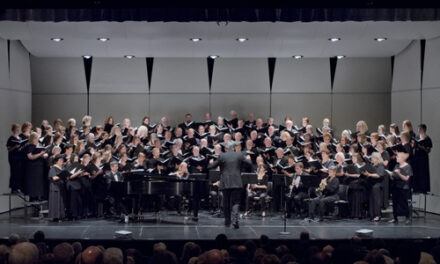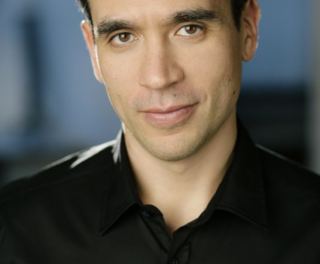This entire concert, under the highly capable direction of Susan Klebanow, showered the listeners’ ears of this packed house of Saturday-night concertgoers in Moeser Auditorium with the finest of aural delicacies. The twenty Chamber Singers performed first, without accompaniment. Their opening pitches were given discreetly by one of the bass singers who has perfect pitch. In addition, throughout each piece, these singers remarkably neither waivered down nor up in their pitch, so easy for a choral group to do.
All the texts in their opening selections, mostly 20th century works, dealt with various aspects of death: “How Long Shall Mine Enemies Triumph Over Me?” by William Byrd; “Then David Mourned” by Thomas Tomkins; “Crossing the Bar” by C. Hubert H. Parry; “Nunc dimittis” by Charles Wood; and “Nunc dimittis” by Arvo Pärt, featuring the competent soloist Melissa Wilson, a graduate student in public health; “Flanders Fields” by Paul A. Aitken; “Come Up from the Fields, Father” by Scott Warner; and the world premiere performance of Peter Lurye‘s “Remember.”
The choir ably handled these unaccompanied selections with a smooth, velvety sound, beautifully-shaped phrasing, and well-balanced voices. In the Aitken composition, the singers executed their half-step dissonances with such precision in an unusual way that enhanced their in-bred strident qualities. Their careful phrasing and exquisite expression led to particularly moving passages. The well-written Warner work included difficult intervals between phrases, which the singers approached with effortless agility.
The Chamber Singers closed their portion of the program with Darius Milhaud’s Cantate de la Paix, Op. 166 (1937), featuring four singers as soloists: sopranos Sindhura Kondaveeti (UNC neuroscience major) and Jordan Taylor (UNC music performance major); alto Trinity Turlington (UNC journalism major, music minor); and tenor Marichi Gupta (UNC math and computer science major). The text eloquently expresses the qualities found in hope that lead to peace. These Chamber Singers can be applauded for conveying so extraordinarily well the messages in these texts.
The second half of the program heralded the world premiere of Kenneth Frazelle‘s of six Songs of War penned by Paul Eliot Green during his time fighting in France and Belgium in World War I. Frazelle, composer and teacher of composition at the University of North Carolina School of the Arts in Winston-Salem, was commissioned by the Paul Green Foundation to set Green’s World War I poems to music. Klebanow conducted the sixty-member Carolina Choir, which was accompanied by Qiao Zheng Goh.
Each of these six poems shares a deeply-felt scene depicted by the chorus, while the music effectively magnifies its primary feeling. The first poem, “Grey Dawn,” portrays a scene of weary watchers searching the sea, with Frazelle capturing the horror and agony found in the text. The highly emotional music and the poetic context of silence on the shore conveys very deep feelings. Soloists Nijah Poteat (UNC music major) and William Woodruff (UNC music major) added thoughts to this dialog. The text of the second poem, “In the Dark Night,” conveys feelings of anxiety; Frazelle increases that feeling through pounding eighth-notes in the music. The next poem. “Evening Lengthens” provides relief from the high distress with a sense of peace, with both a girl and a nightingale singing, all set in a slower musical tempo. But then… the sound of guns returns.
The fourth poem turns light-hearted and coquettish as it supposedly explores “Forty-seven Kinds of Snoring,” as if to vacate oneself from the devastation at hand. The fifth poem, “Empty Sleeves,” depicts the unimaginable pain of peasants who are moving their belongings out of their home, not knowing where their children are. Frazelle responds to this text by writing plaintive music sounds, and musical depictions of agony. Soprano Kayla Richardson-Piché (UNC music performance major), aptly added her vocal skills to this drama. The sixth poem, “Letters from Home,” reveals perhaps his wandering thoughts of being back at home, hoping to relieve the painful homesickness.
Frazelle exhibits very adept skills in his musical depictions of the feelings created by the texts, which skillfully amplify the poetic impact. At the end of the concert, the guests rose to their feet in applause for the privilege of encountering the depths of experiences in music and words of this unusually sensitive man, Green, in his younger years.
Many of Green’s relatives attended this concert, including his daughters, which added another poignant dimension for audience members, The Paul Green Foundation in Chapel Hill holds the copyright on his writings. Green, among many other writings and an unusually illustrious career, is also the author of North Carolina’s well-known outdoor play first performed in 1937 – The Lost Colony.












